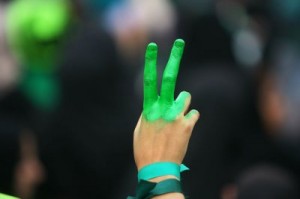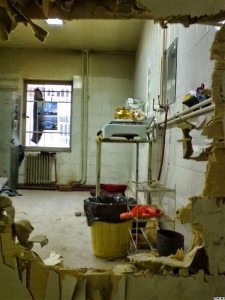The Latest from Iran (28 February): What Do The Statements Mean?
 Sunday, February 28, 2010 at 20:58
Sunday, February 28, 2010 at 20:58  2045 GMT: Sunday Absurdity. A slow day, which leading to a perusing of opinion in the newspapers. Unfortunately, that turns up a piece of anti-Muslim diatribe posing as analysis by Ephraim Karsh in The New York Times: "Muslims Won't Play Together". The slurs have to be read to be believed, but here is the policy recommendation: "A military strike must remain a serious option: there is no peaceful way to curb Iran’s nuclear ambitions, stemming as they do from its imperialist brand of national-Islamism."
2045 GMT: Sunday Absurdity. A slow day, which leading to a perusing of opinion in the newspapers. Unfortunately, that turns up a piece of anti-Muslim diatribe posing as analysis by Ephraim Karsh in The New York Times: "Muslims Won't Play Together". The slurs have to be read to be believed, but here is the policy recommendation: "A military strike must remain a serious option: there is no peaceful way to curb Iran’s nuclear ambitions, stemming as they do from its imperialist brand of national-Islamism."NEW Iran: Understanding the Assembly of Experts Statement “Crisis Continues”
NEW Iran Document: Mousavi’s Interview “Reform Within the Current Framework” (27 February)
Iran Analysis: Now It Gets Interesting….
The Latest from Iran (27 February): The Mousavi Interview
1700 GMT: Where's Mahmoud? President Ahmadinejad has been at a conference in Tehran attended by Palestinian leaders such as Hamas' Khaled Meshaal, Islamic Jihad's Ramadan Abdullah Shallah, and the head of the Popular Front for the Liberation of Palestine (General Command), Ahmed Jibril. Ahmadinejad offered this commentary:
With God's grace and thanks to the Palestinian resistance the occupying Zionist regime has lost its raison d'être. [Israel's] presence even in one inch of the region's soil causes threat, crisis and war. The only way to confront them (Israelis) is through the Palestinian youths' resistance, and that of the regional nations.
1435 GMT: US-Israel Front (cont.). Haaretz has more on Israel Defense Minister Ehud Barak's Iran manoeuvres after his US trip (see 0955 GMT). Barak had indicated earlier that Israel would not pursue military action but would look for tougher sanction; however, in a talk in Washington, he returned to the formula that "everything is on the table":
It's clear to me that the clock toward the collapse of this regime works much slower than the clock which ticks toward Iran becoming a nuclear military power. And this is the reason why simultaneously with diplomacy and effective sanctions, we recommend to all players not to remove any option from the table and we adopt this attitude for ourselves as well.
1400 GMT: Political Prisoner News. Journalist Ali Hekmat, editor-in-chief of the banned newsaper Khordaad, has been released after two months in detention. Civil rights activist Jamshid Zarei has also been freed.
1325 GMT: That Larijani Fellow. Speaker of Parliament Ali Larijani, continuing to grab headlines after his trip to Japan, has spoken to the Majlis about the capture of Jundullah leader Abdolmalek Rigi, "Fortunately, his confessions confirmed our previous information on the close cooperation between the US and NATO and the terrorist grouplet."
1300 GMT: No Protests. A day after Mir Hossein Mousavi called for the regime to allow rallies, Tehran Prosecutor General Abbas Jafari Doulatabadi has given a sharp rejection:
Even though some go on trying to agitate the atmosphere in society with statements... they've been given the answer by the people. We will not witness street demonstrations and we will not allow anyone to come to the streets to disrupt public security without proper permits....
Even though threats against the revolution will not come to an end, we will not succumb and certainly one day in the not so distant future despair will take them and they will surrender. The file on the election has been closed and law enforcement agencies have been asked to preserve security.
Having wielded a large stick, Doulatabadi offered a small carrot with the promise that some post-election detainees would be released before the Iranian New Year.
1220 GMT: O" the Economic Front. Kalemeh denounces President Ahmadinejad's slogan of bringing oil income to people's tables, comparing it with "vanished billions" in revenues.
Rah-e-Sabz reports on a protest at an Isfahan steel plant over seven months of unpaid wages.
1215 GMT: Bluster of Day. Deputy Revolutionary Guard commander Hossein Salami warns, "Iran is standing on 50% of world's energy resources. If it decides to do so, Europe will spend the winter in the cold."
1205 GMT: Maintaining His Silence. The Supreme Leader used a meeting with Tehran's ambassador to take a nationally-televised swipe at the International Atomic Energy Agency, "Measures and reports of the agency show its lack of independence.... Unilateral acts erode trust in this institution and the United Nations and it is very bad for the reputation of these international assemblies."
No news there, as it is a restatement of Iran's public line on the IAEA, a day before the Agency's four-day discussion of a draft report on Tehran's nuclear programme. What is more intriguing is the Supreme Leader's lack of reference to Ali Larijani's manoeuvres in Japan for "third-party enrichment" (see 0935 GMT).
1155 GMT: MediaWatch. Leading US newspapers have noted and evaluated the Mousavi interview. Borzou Daragahi of the Los Angeles Times leads with Mousavi's accusation of the regime's "wasteful exercise" of 22 Bahman (11 February) but then puts his key point, "Mousavi offered few specifics on what the so-called green movement should do next."
In The Washington Post, Thomas Erdbrink takes a similar line with Mousavi's denuncation of the Government as a "gang with no respect for Iran's interests" and the note that "he did not, however, propose new strategies". Nazila Fathi has a shorter piece in The New York Times, following the Associated Press, with the criticism of the Iranian leadership as a dictatorial "cult" but with no comment on Mousavi's goals.
0955 GMT: On the US-Israel Front. Laura Rozen has an intriguing reading of Israeli Defense Minister Ehud Barak's appearance at the Washington Institute of Near Policy, after his meetings with senior Obama Administration officials:
It became quite clear that [Barak] did not want to answer [a] question about the state of U.S.-Israel relations on Iran....It was his impression that Washington believes that, while it’s highly undesirable, at the end of the day the U.S. could live with a nuclear Iran; [however] for Israel, Barak said, it would be a “tipping point” in the strategic equation in the region.
0945 GMT: Today's Propaganda Special. Iranian state media pronounces, "Rigi planned to meet Holbrooke in Kyrgyzstan", which paints the picture of the Jundullah leader sitting down with President Obama's special envoy on Afghanistan and Pakistan, Richard Holbrooke.
The source? "Famous Washington, D.C. based investigative journalist and reporter Wayne Madsen". Funny, but I don't actually see that on the website of "famous reporter" Madsen.
Safer, I think, for Iran's loudspeakers to rely on "Iranian forces bust terrorist cell in Azarbaijan".
Meanwhile, Jundullah has chosen a new leader to succeed Rigi.
0940 GMT: Speaking of Larijani. Ali Larijani has avoided the nuclear issue on his return to Iran from Japan, issuing instead an un-controversial condemnation of US policy in Afghanistan and an announcement that Japanese officials are willing to cooperate with Iran on the reconstruction of the Afghan infrastructure.
0935 GMT: The Larijani Debate. Elsewhere, there is a spirited discussion going on, as Ali Larijani returns to Iran from a five-day trip, over the significance of his manoeuvres in Japan, especially on the nuclear programme.
I stand by the reading that Larijani's sudden embrace of "3rd-party enrichment" (no doubt backed by the Supreme Leader) is a political move meant not only to keep open links with the international community but to out-manoeuvre and even push aside President Ahmadinejad. Mr Verde is more cautious:
I think Larijani’s talk of enrichment by Japan is an attempt by the Islamic Republic to break or slow down the anti-Iran posturing. Larijani may be chipping away at Ahmadinejad, but it is all with Supreme Leader's permission.
The post-elections protest shocked the regime and Khamenei. And the Larijani/[Ahmad] Tavakoli spat with Ahmadinejad is possibly an attempt to show that the Republic is not just one voice (that of the Supreme Leader) but it actually tolerates dissent.
A well-placed EA contact, however, is dismissive that there is any significance, writing of "incremental
developments that oftentimes go nowhere".
0930 GMT: We have published a Sunday special: there is a summary of the official statement of the Assembly of Experts, and a detailed analysis by Mr Verde: "The institutions of the Islamic Republic are unable to pull it out of the current crisis. All that have any power (at least on paper) are under the direct, and at times illegal, control of Khamenei."
0745 GMT: It will be a slightly later start this morning, as we wrap up our coverage of the Chile earthquake and tsunami watch and also pick up on the important statements out of Iran.
We have posted the English translation of Mir Hossein Mousavi's Saturday interview with Kalemeh. Initial reading is both of a Mousavi trying to maintain the momentum of opposition but also carefully defining how far the challenge goes --- is it enough to call for the "spread of awareness", "free rallies", and "adherence to the Constitution" if the regime stands firm against even those measured demands? We'll think about that today, looking forward to an analysis on Monday.
Later today, however, we may have an equally important reading. The official statement of the Assembly of Experts, which did not appear for several days after last week's meeting, is now posted. Beyond its loyalty to the Supreme Leader, the references to the opposition are not clear. Was this really the declaration that "sedition" would be put down and opposition would longer be acceptable in the Iranian system?
 Abbas Jafari Doulatabadi,
Abbas Jafari Doulatabadi,  Abdolmalek Rigi,
Abdolmalek Rigi,  Ahmed Jibril,
Ahmed Jibril,  Ali Hekmat,
Ali Hekmat,  Ali Larijani,
Ali Larijani,  Assembly of Experts,
Assembly of Experts,  Associated Press,
Associated Press,  Ayatollah Ali Khameini,
Ayatollah Ali Khameini,  Borzou Daragahi,
Borzou Daragahi,  Ehud Barak,
Ehud Barak,  Ephraim Karsh,
Ephraim Karsh,  Hamas,
Hamas,  Hossein Salami,
Hossein Salami,  International Atomic Energy Agency,
International Atomic Energy Agency,  Islamic Jihad,
Islamic Jihad,  Islamic Revolutionary Guards Corps,
Islamic Revolutionary Guards Corps,  Israel,
Israel,  Jamshid Zarei,
Jamshid Zarei,  Japan,
Japan,  Jundullah,
Jundullah,  Kalemeh,
Kalemeh,  Khaled Meshaal,
Khaled Meshaal,  Khordaad,
Khordaad,  Kyrzyzstan,
Kyrzyzstan,  Laura Rozen,
Laura Rozen,  Los Angeles Times,
Los Angeles Times,  Mir Hossein Mousavi,
Mir Hossein Mousavi,  Mr Verde,
Mr Verde,  Nazila Fathi,
Nazila Fathi,  New York Times,
New York Times,  Palestine,
Palestine,  Popular Front for the Liberation of Palestine,
Popular Front for the Liberation of Palestine,  Rah-e-Sabz,
Rah-e-Sabz,  Ramadan Abdullah Shallah,
Ramadan Abdullah Shallah,  Richard Holbrooke,
Richard Holbrooke,  Thomas Erdbrink,
Thomas Erdbrink,  Washington Institute for Near East Policy,
Washington Institute for Near East Policy,  Washington Post,
Washington Post,  Wayne Madsen in
Wayne Madsen in  Middle East & Iran
Middle East & Iran 



